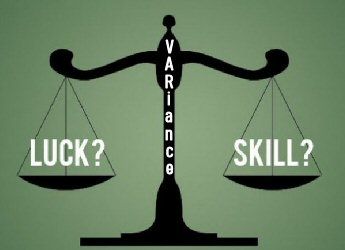Gambling Terminology: Difference between Luck, Variance and Skill
 If you’ve ever known a professional gambler, the following content should be extremely familiar. If you happen to be a pro poker or blackjack player, you may recognize some of these traits in yourself. I’m talking about the way gamblers use certain terms, as opposed to the way a dictionary would define them.
If you’ve ever known a professional gambler, the following content should be extremely familiar. If you happen to be a pro poker or blackjack player, you may recognize some of these traits in yourself. I’m talking about the way gamblers use certain terms, as opposed to the way a dictionary would define them.
Three of the most common misinterpretations revolve around the words luck, variance and skill. It’s not that gambling pros don’t know what these words mean. It’s that they don’t always label relative situations accurately.
Gambling Terminology: Luck, Variance, Skill
Let’s take a close-up look at each of these terms, and what they mean to casual and professional gamblers.
Luck | |
| success or failure apparently brought by chance rather than through one’s own actions. |
When the average player thinks of luck in gambling, they might think about winning a slot machine jackpot. They might think back to that time they were dealt a 9 after hitting 12 in blackjack. That was really lucky, right? A blackjack pro wouldn’t think so. More often than not (depending on the dealer’s card), hitting 12 is the right move.
A seasoned blackjack player, much like a professional poker player, considers luck to be making the wrong move, but being rewarded for it anyway. If a player hits 19 and gets a 2, that’s luck! Hitting 12 and not busting is nothing more than following the law of probability. After all, there are only 4 cards that can bust a 12, and 9 that won’t.
But poker pros don’t see themselves as making incorrect moves. Only their opponents do that. Therefore, when a poker player loses, they tend to see it as their opponent getting lucky. Or, if an opponent made the right move, they chalk it up to variance…
Variance | |
the fact or quality of being different, divergent, or inconsistent. |
In the gambling realm, variance refers to the inconsistency of probabilities. Taking a page from the example above, we see that a player has more than a 2/3 chance of getting 9 or below when hitting 12, and less than 1/3 chance of busting with a 10 or face card. Let’s assume the player hits 12 and busts. A few hands later, he hits 12 again, and also busts. Odds say this won’t happen, but variance says it can.
In the long run, after years of playing blackjack, this player should experience a near-perfect ratio of busts when hitting 12, but in the short term, variance is king. A poker player who does everything right – by the books and by the odds – can still lose.
When this happens, a pro will call it variance, usual because he is unwilling to admit that he might have been outplayed, or that he might have made the wrong choice; read the wrong tell; misread some piece of information; or simply took a bad risk. Whatever the case, the cause is always luck or variance, and never because the other player has more skill…
Skill | |
the ability to do something well; expertise. |
Someone who is skilled at something is capable of doing it easier, faster, more effectively than the average person. A professional poker player has more skill than someone who just learned how to play Texas Hold’em. Does this mean the pro will beat the newbie? Any betting man would say yes, laying their money on the pro. Odds are, he’ll win that bet too. But if luck and variance have taught us anything, it’s that there’s no such thing as a sure thing in gambling.
Skill does matter, and it does make a difference. A skilled blackjack player with precision card counting skills can get an edge over the house. A skilled poker player is going to win more consistently against a casual player. But it also causes some players to become overly confident in their abilities, if not their definitions of gambling terminology. The fact is, the recreational blackjack player – the first-time poker player – the guy who walked up and pressed the spin button just once on a slot machine – can emerge victorious.











